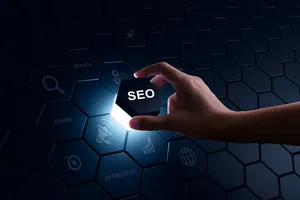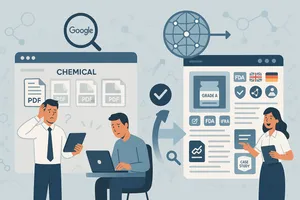Unlocking the Secrets of Mastering Off-Page SEO
5 mins | 17 Mar 2023

Table of Contents
3. 4 Key Components of Off-Page SEO
4. Advanced Off-Page SEO Strategies
5. Avoiding These Common Mistakes in Off-Page SEO Optimization
6. Future Trends in Off-Page SEO
1. Introduction
Off-page SEO refers to the activities outside your website that affect how it appears in search results. It's different from on-page SEO, which focuses on what is inside your website. Off-page SEO is about things like getting other sites to link to yours. Being active on social media and getting your brand mentioned through different links is the main work of off-page SEO. All these things help make your website seem more important and trustworthy to search engines.
It works like a bridge that connects your site to the whole internet, making it more famous and trustworthy. If you use off-page SEO well, you can make your site appear higher in search results. This doesn't just make your brand more visible; it also helps people trust your website more.
In this guide, we'll go through all the things that make a good off-page SEO plan. We'll start with the basics and then move on to more advanced information so you'll know everything you need to be great at off-page SEO. Let's see how off-page SEO can make your website more successful.
Keep following to learn about the main parts of off-page SEO and some cool tricks that can make your online footprint even bigger.
2. What is Off-Page SEO
Search engine optimization has two main categories: Off-Page and On-Page SEO. On-page SEO involves working on the content and code of a webpage directly. On the other hand, Off-Page SEO includes actions like getting other websites to link to yours. On-Page SEO is about setting up a strong website, while Off-Page SEO is about building signals outside your site that show it's trustworthy on the web.
Search engines want to show users the best and most relevant search results. They look at different off-page factors to decide if a website is trusted and relevant. One big thing they look at is the quality and number of links from other sites to a particular site.
Search engines see off-page factors as a signal of trust from other important websites. A strong Off-Page SEO plan can change how much people see a website and how many visitors it gets from search engines. By focusing on off-page SEO factors, businesses can get ahead, reach more people, and become leaders in their field. This can mean more people know about them and use their services. Let's be aware of how important off-page SEO is in digital marketing.
3. Four Key Components of Off-Page SEO
Understanding the significance of Off-Page SEO in simple language. Here are the 4 key components to boost your online presence. These off-page SEO techniques are easy to understand and implement in your website or project easily.
I. Backlinks
Building backlinks is a key part of successful Off-Page SEO. Good quality backlinks are like ratings from other trustworthy websites, showing search engines that your content is valuable and reliable. These links bring visitors to your site but also make your site seem more important and trustworthy to search engines. So, it's really important to get good quality backlinks for strong off-page SEO optimization.
When your site has good-quality backlinks, it shows it's relevant and reliable in your domain. Search engines see these backlinks as signs of trust from other good sources, which can make a big difference in how strongly your site shows in search results. When good sites link back to your content, it brings in more visitors, and it tells search engines that your site is a really useful place in your area.
To get good-quality backlinks, you can:
- Contact relevant websites and important people in your field to ask for links.
- Make really useful and interesting content that people naturally want to link to.
- Take part in events, conferences, and online meetings in your industry to meet people and find chances to get more references on Google.
You can do this by making really good, helpful, and relevant content that answers what the people you want to reach are looking for. If you make content that's interesting and useful, other websites will want to link to it and use it as a source because it's so good and helpful.
III. Social media
Social media is important for making your brand famous and getting links. When you talk to your audience on social media, it helps build a community and also helps with your off-page SEO by getting more people to share your links and talk about you. Likes, shares, comments, and how much people talk about you on social media are seen more and more by search engines as signs that your website is important and relevant. Being active on social media can help more people see your brand and visit your website.
Use social media to talk about your content and talk to the people who follow your brand. Ask them to share your content and link back to your website so more people see it, and your off-page SEO gets better. When you join in conversations and share useful ideas in your industry, it shows that your brand knows what it's talking about. This can make more people want to link to you and share your content.
Here are some things you can do on social media:
- Make interesting and shareable posts that make people want to talk and share.
- Answer comments and messages quickly so people feel like they can trust you.
- Share important news and good information from your industry to show that your brand knows what customers need.
Engage with your audience by asking questions, conducting polls, and hosting live Q&A sessions to foster a sense of community and encourage active participation.
III. Online Brand Mentions
It's important to watch when people mention your brand online, whether they link to your site or not. This helps you understand how people see your brand and talk about it online.
When your brand is mentioned online, it's like a digital thumbs-up that shows people trust your brand. Even if they don't link to your site, these mentions help because they make more people recognize and trust your brand.
Use different online tools and platforms to watch and handle your brand mentions. Keep an eye on both linked and unlinked mentions. There are many chances to get more links without mentions to build relationships. Talk to the websites and platforms that mention your brand to build good relationships, which will make your brand's online reputation and trust stronger.
You can use tools like Google Alerts, Brand24, and Mention to watch and track when your brand is mentioned online. These tools can help you know how people talk about your brand on the web so you can quickly reply to good and bad mentions and do things to make your brand more visible and trusted online.
IV. Guest Posting
Guest posting is a good off-page SEO plan many people use to get good-quality backlinks and inform more people about their brand in their field.
Guest posting has a few benefits:
- You get really good backlinks from important websites in your field.
- More people get to know about your brand and find out about it.
- People start seeing your brand as an important and smart source in your field.
Find websites and blogs in your field that let people write guest posts. Check if these places are good based on how many people like them. Choose places that match what your brand is about and who you want to talk to so your guest posts can have the most effect.
With the effective implementation of these Off-Page SEO strategies, you can strengthen your brand's online presence and visibility.
4. Advanced Off-Page SEO Strategies
After we learn about the main concept of off-page SEO optimization, here we give you the best option for better results in this trending world. By implementing this in your off-page SEO optimization checklist, you will get better results. This strategy belongs to the new digital marketing world. This will help your industries grow well and expand your customer base.
I. Influencer Marketing
Using influencer Marketing is a really good way to make more people know about your brand and trust it. If you work with influencers, it can make your off-page SEO plan even better and help more people know about your brand.
When you work with influencers, you can use their fans and make them trust your brand, too. It can make more people see and like your brand and also make your off-page SEO plan stronger.
This not only brings people to your website but also makes your backlinks look better, which makes your website more important and shows it higher up in search results. Monitor your influencer plans by looking at how many people talk and click on your links.
Use tools to see how well working with influencers brings people to your website and makes more people see your brand. This info can help you see how to make your influencer plans even better and make them work the best they can.
II. Local SEO Strategies
Local SEO strategies are really important for making your brand show up more in certain places. This is great if your business is aimed at people in a specific area.
Make sure your business details are on local business listings like Google My Business and other local directories that are important. Check that your business information is right and the same on every platform. This can make your business appear higher in local search results and make more people in your area see it.
Use local directories and places that mention businesses to make your off-page SEO plan better. Put your business details in good local directories and places that mention businesses to make backlinks. This can help more people see your business online. Ensure your business name, address, and phone number are identical in every directory. This can make your local search engine results better.
Ask happy customers to write good reviews and nice things about your business on your Google My Business listing. Good reviews not only make your local search engine results better but also make your business look more trustworthy. Talk to customers by answering their reviews and dealing with anything they say. This shows that you care about them and want the best service.
III. Content marketing
Content marketing is a great way to make your off-page SEO even better and show that your brand knows what it's discussing in your industry. Make extremely good, helpful, and shareable content that people who you want to reach will like and want to share on the internet. Talk about things that your audience finds hard, give them answers, and share really useful ideas.
Talk about your content on different places, like social media, email newsletters, and websites. Use specific words and hashtags that make your content easier to find and make more people want to discuss and share it. By talking about your content in different places, you can make more people see it and make your off-page SEO plan work even better.
Watch and see how well your content marketing works by using tools that show you how people see and use your content in your off-page SEO. See how people find your content, how much they like it, and how many people do what you want them to do. Use this information to make your content marketing plan even better, make more useful content, and make your off-page SEO even stronger.
So these tricks help you to grow your website on the internet. Attract people from influencer marketing, get a crowd on your website, and get many good reviews and responses. Also, don’t forget to follow local SEO to cover the physical area around your location.
5. Avoiding These Common Mistakes in Off-Page SEO Optimization
Ensure you don't use bad or tricky SEO techniques that can get you in trouble. These are known as black hat techniques. These methods might help you for a while, but they can damage your website in the long run. They can even make search engines take you completely off the results pages.
Some bad black hat techniques to avoid are using too much keyword stuffing, showing different things to people and search engines, making a lot of fake links, and hiding words on your website. Learn about what search engines want and what the best things are to do and don't do so that your off-page SEO optimization (Top 11 do's and don'ts for on-page SEO) is good, and follow the rules of Google search engines.
Having bad backlinks from websites that are spammy or not relevant can impact your website's reputation. Check your backlinks to see if any bad ones are directly removed. Use tools that look at your backlinks to see if they are good or bad. This can ensure your website is seen as more important and trustworthy online.
Making sure you follow what search engines want is important if you want to have good off-page SEO optimization. Learn about what search engines like Google, Bing, and Yahoo say you should do. Make being honest and doing the right thing a priority in your off-page SEO so you have a website that people trust, and that follows what search engines say you should do.
6. Future Trends in Off-Page SEO
The future of off-page SEO strategies is set with the rise of various technologies. Here are some key impacts of emerging technologies on off-page SEO strategies:
Voice Search Optimization: Voice search technologies have become more popular nowadays. Now, companies will need to focus on creating content that suits the way people naturally speak. This means optimizing off-page SEO strategies for voice-based queries to match users' conversations.
Mobile-First Indexing: With the increasing use of mobile devices, search engines are giving more importance to mobile-friendly websites. This clarifies the need for businesses to be sure that their off-page SEO efforts are focused on mobile technology. New industries have to offer a smooth and optimized experience across all devices.
Integration of Visual Search: The integration of visual search technologies is in more demand nowadays. Images, videos, and infographics are the content people most want to see. This involves using techniques like image alt-text optimization and video sitemap creation to improve the visibility and discoverability of visual content in search results.
By keeping up with these upcoming trends and technologies, companies can improve their off-page SEO strategies. This enables them to stay competitive and provide a seamless and engaging user experience. These new curves are changing the demands of off-page SEO.
7. Conclusion
Off-page SEO is more than just search engine rankings. It helps businesses build their online presence, establish credibility, and become industry leaders. By using effective off-page SEO strategies like backlink building, social media engagement, and content marketing, businesses can reach more people and build a loyal customer base.
Off-page SEO connects your website to the larger digital world and makes it more trustworthy. As the digital landscape changes, off-page SEO is important for a company's strong reputation. By keeping up with trends and changes, businesses can use off-page SEO to succeed online and stand out in the digital marketplace.
Author





_desktop_list_webp_488ed91b.webp)








